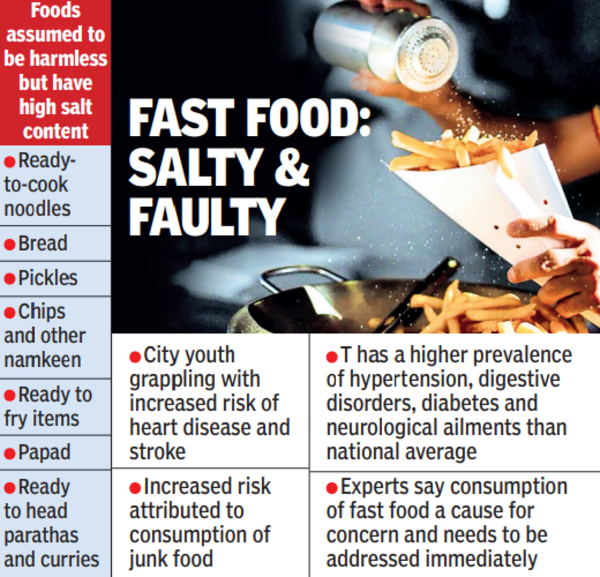Don’t take it with pinch of salt, your heart is at risk | Hyderabad News
Consumption of junk food, which inherently has a high salt content, often leads to daily salt intake way past the requirement. When consumed frequently, it is good enough to double the sodium intake in the body – something many youngsters in the city are grappling with, say health experts.

“Too much salt leads to fluid retention in the body which in turn increases blood pressure. The resultant chronic strain leads to decreased elasticity of blood vessels and increased after-load on the heart and worsening kidney function. As a result, people with high blood pressure have an increased risk of heart disease and stroke,” said Dr Dilip Gude, senior consultant physician, Yashoda hospital.
A 2021 survey by Associated Chambers of Commerce and Industry of India (Assocham) revealed that non-communicable diseases (NCDs) in Telangana are 16.19%, which is higher than the national average of 11.62%. “Telangana particularly has a higher prevalence of hypertension, digestive disorders, diabetes and neurological ailments, as against the national average prevalence rate of these diseases. In Telangana, higher vulnerability to obesity-related NCDs is probably because of choice of food, including salt, chilli and lifestyle choices,” the survey report said.
Kiran Madala, an ICMR-certified researcher, said consumption of fast food is a cause for concern and needs to be addressed immediately. “India which has a sixth of the world’s population consumes double the required amount of salt, which has led to a rapid rise in cardiovascular diseases and strokes. Incidence of the diseases is rising in Telangana too,” he said.
According to a World Health Organisation report, the current estimated global average sodium intake in adult populations is 3.89 gram to 4.01 gram per day. “This is equivalent to 9.88 gram to 10.21 gram of salt per day, which is almost twice the recommended intake,” the report said. WHO recommends a sodium intake of less than 2 gram/day (equivalent to 5 gram or a teaspoon of salt) as it ascribes 1.89 million deaths worldwide to high sodium intake. Cautioning against high sodium intake, Kiran said India scores the lowest in its efforts to reduce salt intake and people’s involvement which indicate bad food choices.
Source link





